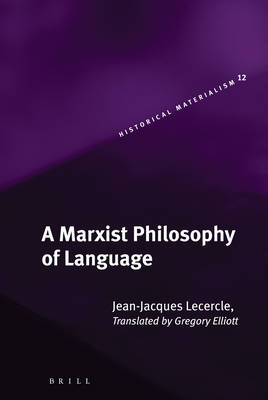
- Afhalen na 1 uur in een winkel met voorraad
- Gratis thuislevering in België vanaf € 30
- Ruim aanbod met 7 miljoen producten
- Afhalen na 1 uur in een winkel met voorraad
- Gratis thuislevering in België vanaf € 30
- Ruim aanbod met 7 miljoen producten
Zoeken
Omschrijving
The purpose of this book is to give a precise meaning to the formula: English is the language of imperialism. Understanding that statement involves a critique of the dominant views of language, both in the field of linguistics (the book has a chapter criticising Chomsky's research programme) and of the philosophy of language (the book has a chapter assessing Habermas's philosophy of communicative action).
The book aims at constructing a Marxist philosophy of language, embodying a view of language as a social, historical, material and political phenomenon. Since there has never been a strong tradition of thinking about language in Marxism, the book provides an overview of the question of Marxism in language (from Stalin's pamphlet to Voloshinov's book, taking in an essay by Pasolini), and it seeks to construct a number of concepts for a Marxist philosophy of language.
The book belongs to the tradition of Marxist critique of dominant ideologies. It should be particularly useful to those who, in the fields of language study, literature and communication studies, have decided that language is not merely an instrument of communication.
The book aims at constructing a Marxist philosophy of language, embodying a view of language as a social, historical, material and political phenomenon. Since there has never been a strong tradition of thinking about language in Marxism, the book provides an overview of the question of Marxism in language (from Stalin's pamphlet to Voloshinov's book, taking in an essay by Pasolini), and it seeks to construct a number of concepts for a Marxist philosophy of language.
The book belongs to the tradition of Marxist critique of dominant ideologies. It should be particularly useful to those who, in the fields of language study, literature and communication studies, have decided that language is not merely an instrument of communication.
Specificaties
Betrokkenen
- Auteur(s):
- Uitgeverij:
Inhoud
- Aantal bladzijden:
- 236
- Taal:
- Engels
- Reeks:
- Reeksnummer:
- nr. 12
Eigenschappen
- Productcode (EAN):
- 9789004147515
- Verschijningsdatum:
- 7/08/2006
- Uitvoering:
- Hardcover
- Formaat:
- Genaaid
- Afmetingen:
- 165 mm x 243 mm
- Gewicht:
- 585 g

Alleen bij Standaard Boekhandel
+ 595 punten op je klantenkaart van Standaard Boekhandel
Beoordelingen
We publiceren alleen reviews die voldoen aan de voorwaarden voor reviews. Bekijk onze voorwaarden voor reviews.








